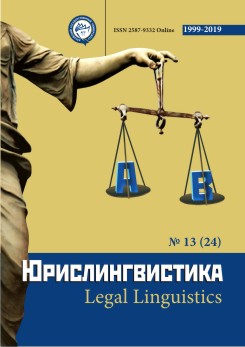Legal term in the legal environment and beyond
Abstract
The article considers the existence of legal terms within the legal environment and outside the language of law. The difference between the terms of various professional spheres is revealed, the specificity of the terminology of the social sciences is established as a means of reducing not only professional, but also social knowledge. The legal term is studied as one of the types of special lexical means having a number of additional functions, foregrounded under the influence of the specifics of legal relations. The features of the functional specificity of the legal term are established both at the level of synchronous interaction of subjects of legal relations, which ensures the significance of the regulatory function of legal terms, derived from the regulatory and protective functions of law, and at the level of diachronous impact, when the axiological function is updated. The features of various types of legal terms are identified and analyzed: common, special technical, special legal. It is also noted that in the conditions of the development of modern society, legal terms are widely spread due to their inclusion in the media outside the legal environment. This often does not lead to an increase in the legal awareness of citizens and, on the contrary, provokes, given the false motivation in the minds of native speakers, the mixing of the semantics of common words and terms, modifying primary meanings in a new discourse. The discourse, in which there are commonly used and special technical legal terms, largely subordinates them to its laws and transforms them in the minds of speakers, leaving them the opposite understanding. The use of legal terms outside the legal environment should be subject to the logic of their legal existence not to the laws governing the functioning of the new discourse.
Downloads
Metrics
References
Барабаш О. В. Разграничение омонимии и полисемии юридических терминов / Вестник Московского государственного гуманитарного университета им. М.А. Шолохова. 2015. № 2. С. 39-49.
Губаева Т. В. Язык и право. М., 2003.
Земляная Т. Б., Павлычева О. Н. Использование терминологии в правотворчестве / Журнал научно-педагогической информации. 2010. № 10. URL: http://www.paedagogia.ru/2010/47-10/110-zemlyanayapavlicheva.
Костерина Ю. Е., Кондратюкова Л. К. Критерии и принципы отбора терминов / Омский научный вестник. 2014. № 1 (125) С. 133-137.
Леоненко Н. Т. Законодательная техника. Новосибирск, 2015.
Мартышко Н. Ю. Смысловая модификация терминов в современном законодательном дискурсе: диссертация ... кандидата филологических наук: 10.02.19. Волгоград, 2015.
Милославская Д. Юридические термины и их интерпретация / РЭГ. № 21 [27]. 1999.
Рахманова Л. И., Суздальцева В. Н. Современный русский язык. Лексика. Фразеология. Морфология. М., 1997.
Сичинава Н. Г. Переносное употребление юридических терминов в общелитературном языке / Язык и право: актуальные проблемы взаимодействия. 2012.
Словарь-справочник лингвистических терминов / Д. Э. Розенталь, М. А.Теленкова. Изд. 2-е. М.,1976.
Туранин В.Ю. Сущность и значение дефиниции в современном законодательном тексте / Современное право. 2006. № 5. С. 43-48.
Юридический энциклопедический словарь / под ред. А. В. Малько. 2-е изд. Москва, 2016.
References
Barabash, O. V. (2015). Differentiation of homonymy and polysemy of legal terms [Razgranicheniye omonimii i polisemii yuridicheskikh terminov]. Bulletin of Moscow State University for the Humanities M.A. Sholokhov, 2, 39-49 (in Russian).
Dictionary of linguistic terms [Slovar'-spravochnik lingvisticheskikh terminov] (1976). D. E. Rosenthal, M. A. Telenkova (Eds.). Moscow (in Russian).
Gubaeva, T.V. (2003). Language and law [Yazyk i pravo]. Moscow (in Russian).
Kosterina, Yu. E., Kondratyukova, L.K. (2014). Criteria and principles for the selection of terms [Kriterii i printsipy otbora terminov]. Omsk Scientific Bulletin, 1(125), 133-137. (in Russian).
Legal Encyclopedic Dictionary [Yuridicheskiy entsiklopedicheskiy slovar'] (2016). A.V. Malko (Ed.). Moscow (in Russian).
Leonenko, N. T. (2015). Legislative technique [Zakonodatel'naya tekhnika]. Novosibirsk (in Russian).
Martishko, N. Yu. (2015). Semantic modification of terms in the modern legislative discourse. Thesis of Doctoral Dissertation. [Smyslovaya modifikatsiya terminov v sovremennom zakonodatel'nom diskurse]. Volgograd (in Russian).
Miloslavskaya, D. (1999). Legal terms and their interpretation [Yuridicheskiye terminy i ikh interpretatsiya]. REG, 21(27) (in Russian).
Rakhmanova, L.I., Suzdaltseva, V.N. (1997). Modern Russian language. Vocabulary. Phraseology. Morphology. [Sovremennyy russkiy yazyk. Leksika. Frazeologiya. Morfologiya]. Moscow (in Russian).
Sichinava, N. G. (2012). The portable use of legal terms in the general literary language [Perenosnoye upotrebleniye yuridicheskikh terminov v obshcheliteraturnom yazyke]. Language and Law: Actual Problems of Interaction (in Russian).
Turanin, V.Yu. (2006). The essence and meaning of the definition in the modern legislative text [Sushchnost' i znacheniye definitsii v sovremennom zakonodatel'nom tekste]. Modern Law, 5, 43-48 (in Russian).
Zemlyanaya, T. B., Pavlycheva, O. N. (2010). Use of terminology in law-making [Ispol'zovaniye terminologii v pravotvorchestve]. Journal of scientific and pedagogical information, 10. Available from: http://www.paedagogia.ru/2010/47-10/110-zemlyanayapavlicheva (in Russian).
Copyright (c) 2019 Наталья Громова

This work is licensed under a Creative Commons Attribution 4.0 International License.
The authors, which are published in this journal, agree to the following conditions:
1. Authors retain the copyright to the work and transfer to the journal the right of the first publication along with the work, at the same time licensing it under the terms of the Creative Commons Attribution License, which allows others to distribute this work with the obligatory indication of the authorship of this work and a link to the original publication in this journal .
2. The authors retain the right to enter into separate, additional contractual agreements for the non-exclusive distribution of the version of the work published by this journal (for example, to place it in the university depository or to publish it in a book), with reference to the original publication in this journal.
3. Authors are allowed to post their work on the Internet (for example, in a university repository or on their personal website) before and during the review process of this journal, as this may lead to a productive discussion, as well as more links to this published work (See The Effect of Open Access).










